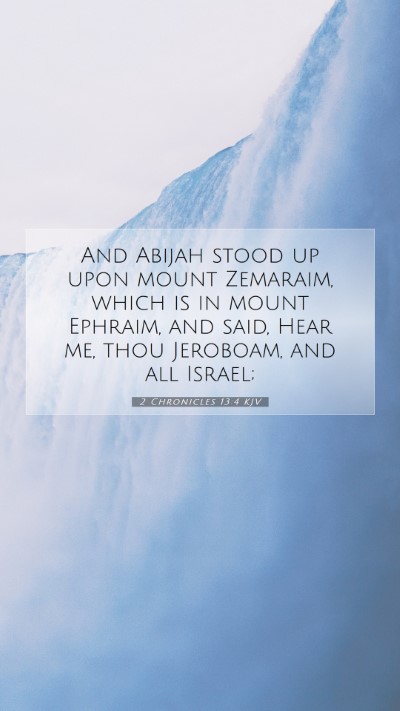Understanding 2 Chronicles 13:4
In this section, we delve into 2 Chronicles 13:4, a verse that marks a significant moment in the narrative of Israel's divided kingdom. The following commentary will explore the verse's meaning, interpretations, and its implications in a broader biblical context.
Verse Overview
2 Chronicles 13:4 (ESV): "Then Abijah stood up on Mount Zemaraim, that is in the hill country of Ephraim, and said, 'Hear me, O Jeroboam and all Israel!' "
Historical Context
This verse takes place during the reign of Abijah, king of Judah, who addresses Jeroboam, the king of the northern kingdom of Israel. This moment is crucial as it reflects the tensions and conflicts following the division of the United Monarchy into the kingdoms of Israel and Judah.
Commentary Insights
-
Matthew Henry's Commentary:
Henry emphasizes Abijah’s declaration as a call to unity and a reminder of the covenant that God established with David's lineage. He notes the boldness of Abijah in confronting Jeroboam, which highlights the importance of God’s promises amidst political strife.
-
Albert Barnes' Notes:
Barnes discusses the significance of Abijah standing on Mount Zemaraim, underscoring the geographical symbolism. This mount represents a position of authority and a vantage point from which a leader addresses the people. Jeroboam’s authority is being challenged, showcasing the divine right of the Davidic line.
-
Adam Clarke's Commentary:
Clarke notes the theological implications in Abijah’s speech, which is a reminder to Israel of their covenantal obligations. His call to "hear" is a plea for recognition of God's sovereign will and a warning against Idolatry propagated by Jeroboam. Abijah’s role serves to assert Judah's claim as the rightful continuation of God’s promises to Israel.
Thematic Connections
This verse encapsulates several themes pertinent to study and understanding Scripture:
- Divine Sovereignty: Abijah's speech emphasizes that God is the ultimate ruler and that His covenant with David has not been forgotten.
- Leadership and Responsibility: The confrontation illustrates the responsibilities of leaders to adhere to God’s commands and to heed His will, as exemplified by Abijah.
- Call for Repentance: The address serves as an invitation for the northern tribes to return to true worship, thus highlighting the importance of repentance in biblical narratives.
Lessons for Today
For modern believers, this passage is rich with lessons. It calls people to remember their spiritual heritage, to recognize the importance of godly leadership, and to commit to the covenant relationship with God. The themes of authority and familiarity with God’s Word resonate in contemporary discussions around faith and leadership in both religious and community contexts.
Application of the Verse
When exploring this verse in bible study groups or online bible study platforms, it can serve as a focal point for discussions regarding:
- How to interpret Biblical leadership in light of God’s sovereignty.
- Understanding difficult Bible passages regarding conflicts in faith.
- Applying Old Testament teachings to modern life, particularly those relating to covenant and community.
Related Cross References
- 1 Kings 12:16-20: The story of the division of the kingdom.
- 2 Chronicles 11:1-4: Rehoboam's initial response to the division and God's guidance.
- 1 Kings 15:4-5: Reference to the promise made to David and his descendants.
- 2 Chronicles 13:12: The ongoing struggle between the kingdoms of Israel and Judah.
- Matthew 22:32: Acknowledgment of the God of Abraham, which ties back to covenantal themes.
Conclusion
The exploration of 2 Chronicles 13:4 reveals profound insights into the nature of kingship, the importance of following God’s covenant, and the call to faithfulness that echoes through Scripture. For those seeking deeper biblical exegesis or Bible verse commentary, engaging with this passage offers a pathway for understanding core principles of faith applicable to daily life.


